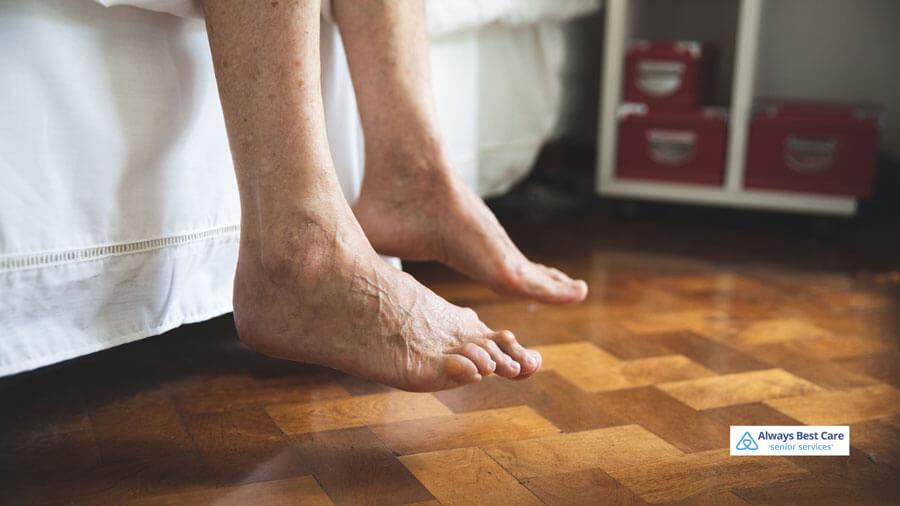On Your Feet: Common Foot Problems for Seniors

Feet are intricate structures comprised of 26 bones, 33 joints, and an even more significant number of muscles, tendons, and ligaments. With age, the skin and padding on the feet thin out, circulation diminishes, and bones may become brittle. These changes increase the risk of injuries and other foot problems, making it essential for seniors to adopt a proactive approach to foot care.
As we age, our feet often bear the brunt of years of activity, and their care becomes crucial to maintaining mobility and overall well-being. This guide delves into seniors’ most common foot problems, offering practical advice on prevention and management to ensure optimal foot health.
Table of Contents
Inspect Your Feet Daily
Routine foot inspections are a key preventive measure. Seniors or their caregivers should examine the feet daily for any changes such as swelling, cuts, sores, or skin color and texture changes. A long-handled mirror can aid in viewing hard-to-see areas, ensuring no issue goes unnoticed.
Move Your Feet
Limited mobility can impair foot circulation, leading to swelling and discomfort. Seniors should be encouraged to engage in gentle foot exercises, such as rotating the ankles and stretching, to enhance blood flow. Elevating the feet when seated and walking periodically can also help reduce swelling and improve circulation.
Keep Nails Trimmed
Ingrown toenails are a common and painful issue for seniors, often complicating the ability to walk comfortably. Nails should be trimmed straight across regularly to prevent them from growing into the surrounding skin. Performing this task after a bath or shower when nails are softer makes the process easier and reduces the risk of injury.
Use a Moisturizer
Applying moisturizer daily can significantly improve the skin’s condition on the feet, preventing dryness and cracks that are prevalent in senior skin. Specialized foot creams are recommended for those with particularly dry or calloused feet, helping to maintain smooth, healthy skin.
Wear Good Fitting Shoes
Wearing well-fitting, supportive shoes is vital for avoiding foot problems. Shoes should provide good arch support, have a firm sole to shield the feet from sharp objects, and feature non-slip soles to minimize the risk of falls. Regularly assessing shoe fit is important, as foot size can change with age.
It’s important not to ignore foot pain or other abnormalities. Consulting a healthcare provider about foot issues can lead to early detection and treatment of potential problems. Seniors should be encouraged to discuss any foot concerns during medical visits.
Be Proactive about Your Foot Health
Many seniors benefit from the support of in-home caregivers who can assist with routine foot care, such as moisturizing, nail trimming, and daily inspections. These caregivers can also help arrange medical appointments and modify the home to make it safer, thereby preventing falls and related injuries. Contact Always Best Care of Friendswood at (281) 954 6096 to schedule a free consultation and learn more about how you can benefit from in-home care.





